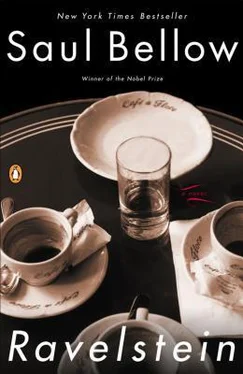"Then why shouldn't I dine with Grielescu and his wife?"
"No objection whatever, as long as you're aware of the facts."
"And what are the facts, in their case?"
"Grielescu is making use of you. In the old country he was a fascist. He needs to live that down. The man was a Hitlerite."
"Come, now…"
"Has he ever denied that he belonged to the Iron Guard? "
"It's never come up."
"You haven't brought it up. Do you have any memory of the massacre in Bucharest when they hung people alive on meat hooks in the slaughterhouse and butchered them-skinned them alive?"
One rarely heard Ravelstein speaking of such things. He would now and then refer to "History" in large Hegelian terms, and recommend certain chapters of the Philosophy of History as great fun. With him gloomy conversations on the "full particulars" were extremely rare. "You know Grielescu was a follower of Nae Ionesco, who founded the Iron Guard. Doesn't he ever mention this?"
"Now and then he does speak of Ionesco, but mostly he talks about his days in India and how he studied under a yoga master."
"That's his Eastern glamour fakery. You're much too soft on people, Chick, and it's not entirely innocent, either. You know he's faking. There's an unspoken deal between you…. Must I spell it out?"
As a rule, Ravelstein and I spoke plainly to each other. _Verbum sat sapienti est__. The Grielescus were socially important to Vela. I had a considerable gift for noting the phenomena and I was aware that Vela gave me good marks for being so polite to Radu and always on my best behavior with Mme. Grielescu. My small talk in French with Madame gave Vela great satisfaction. But Ravelstein was taking a very serious view of my relations with these people. When he was dying he seemed to feel it necessary to speak more openly about matters we had never felt it necessary to discuss.
"They use you as their cover," said Ravelstein. "You wouldn't have become chummy with those Jew-haters. But these were Vela's friends, and you put yourself out for them, and you gave Grielescu exactly what he was looking for. As a Romanian nationalist back in the thirties he was violent toward the Jews. He wasn't an Aryan-no, he was a Dacian." [The Dacians were to Romania what the Aryans were to Germany.]
I knew all that, well enough. I was aware also that Grielescu had had a close connection with C. G. Jung, who saw himself as some sort of Aryan Christ. But what is one to do about the learned people from the Balkans who have such an endless diversity of interests and talents-who are scientists and philosophers and also historians and poets, who have studied Sanskrit and Tamil and lectured in the Sorbonne on mythology; who could, if closely questioned, tell you also about persons they had "known slightly" in the paramilitary Jew-hating Iron Guard?
The fact was that I enjoyed watching Grielescu. He had so many tics. He was a fidgeting, pipe-digging, pipe-stuffing smoker, pushing wire cleaners into the stem of his briar or paring away at the carbon cake in the bowl. He was short and bald, but he let his back hair grow long; it bushed out over his collar. His scalp, wide-open as an estuary, was heavily veined; it looked congested. Very unlike Ravelstein's green-oval-melon baldness. While he dithered over his woolly-bear pipe cleaners Grielescu would continue to spell out some esoteric topic or other. His brows were bushy and his broad face was prepared for an exchange of ideas. But there was no exchange, for he was off inwardly on some topic from myth or history about which you had nothing to tell him. I didn't mind at all. I don't like the responsibilities that come when you have to do the talking. But everybody has something like a lawn of random knowledge, and it's very pleasant to have it kept watered and green for you. Sometimes Radu talked about Siberian shamanism; or then again it might be marriage customs in primitive Australia. It was assumed that you had come to listen or to learn from Radu. Mme. Grielescu had even arranged the parlor furniture with this in mind. "This was how he steered the conversation away from his fascist record," said Ravelstein. "But the record nevertheless shows what he wrote about the Jew-syphilis that infected the high civilization of the Balkans."
He turned out to be right. Grielescu had attached himself to the Nazis, not to the milder, Italian form of fascism. It's hard to say how political Mme. Grielescu had been. My guess is that in prewar days she was a stylish beauty, an upper-class flapper. You could easily picture her in a cloche hat stepping out of a limo. Women who wore good clothes and vivid lipstick generally had no politics. These European ladies monitored the social behavior of their husbands-the males of their set. Men existed to hold doors open and draw back dining-room chairs.
Mme. Grielescu was never altogether well. To judge by her wrinkles she was over sixty, unhappy about it but also very exacting with men-a walking manual of etiquette. It was impossible to guess what she knew about her husband's Iron Guard past. In the late thirties, when the Germans had conquered France, Poland, Austria, and Czechoslovakia, Grielescu became something of a cultural big shot in London and later he cut a figure in Lisbon under the Salazar dictatorship.
But by now his midcentury politics were dead and buried. When Vela and I dined out with the Grielescus the conversation was not about war and politics but about archaic history or mythology. The professor with a white silk turtleneck shirt under his dinner jacket pulled chairs out for the ladies and pinned their corsages for them. His hands shook. He fussed over the champagne. "He paid the bill in cash from a wad of fifties. No credit cards."
"I can't see him at the bank drawing money," said Ravelstein.
"Probably he sends his secretary to cash a check. Anyhow, he pays with clean, unwrinkled currency. He doesn't even count, he drops a bundle of green bills and makes a 'take it all away' gesture. Then he rushes to the other side of the table to light his wife's cigarette. There's all the gallantry, the _hommages__, a standing order at the florist's for roses, and the hand-kissing and bowing."
"All done in French. And there's a different standard for Americans. And you're a Jew, besides. The Jews had better understand their status with respect to myth. Why should they have any truck with myth? It was myth that demonized them. The Jew myth is connected with conspiracy theory. The Protocols of Zion for instance. And your Radu has written books, endless books, about myth. So what do you want with mythology, anyway, Chick? Do you expect to be tapped one of these days and be told that you have now become an elder of Zion? Just give a thought now and then to those people on the meat hooks."
Ravelstein and I endlessly discussed the Balkan fix I was in, but in continuing this narrative, I see that I have to begin by closing out Vela. She has to be disposed of for once and for all. This is not as simple as you might suppose. She was gorgeous and beautifully dressed and memorably made up. On the telephone she chirped like Papagena. Ravelstein was almost alone in describing her as a tasteless dresser. He saw her as a superior manager of the externals. In political terms it could be said that she was out to be elected by a landslide. But Ravelstein did not agree. "Once you begin to suspect her, the whole production falls apart," he said. "Too much rational planning." But then he added, "She was right to throw you out."
"Why do you say that?"
"Because you would have murdered her eventually." He didn't say this gloomily. To him the thought of such a murder was a good thing. It did me credit. "She had a sex-hex on you, so you had to be thinking of a violent death for her. She chose the worst moment possible, just after the deaths of both your brothers, to tell you she was filing for a divorce."
Читать дальше












